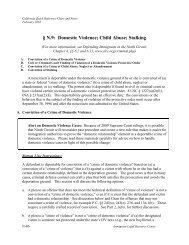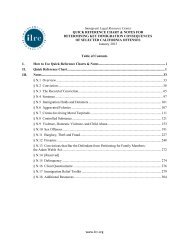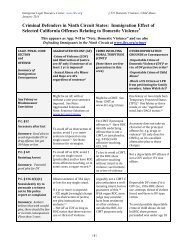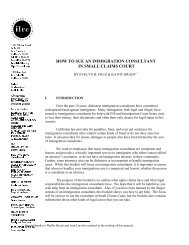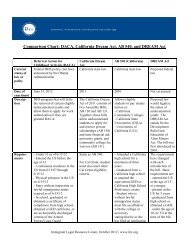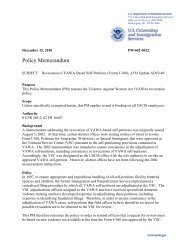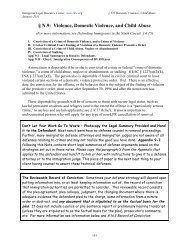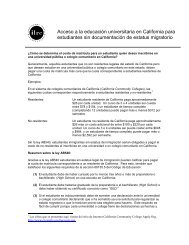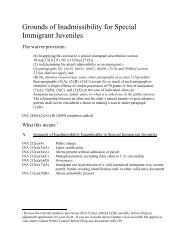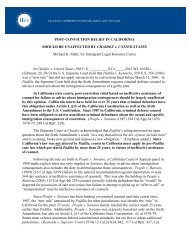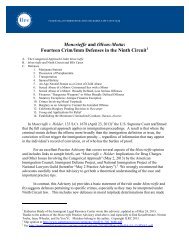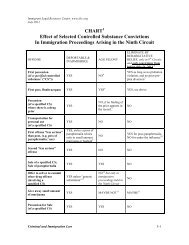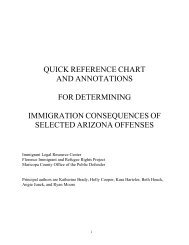Inspiring Leadership in Immigrant Communities - ILRC
Inspiring Leadership in Immigrant Communities - ILRC
Inspiring Leadership in Immigrant Communities - ILRC
- No tags were found...
You also want an ePaper? Increase the reach of your titles
YUMPU automatically turns print PDFs into web optimized ePapers that Google loves.
<strong>Inspir<strong>in</strong>g</strong> <strong>Leadership</strong> <strong>in</strong> <strong>Immigrant</strong> <strong>Communities</strong>January 2003• It is an effective way to encourage people to take advantage of programs such asnaturalization that will benefit their families as well as the immigrant communityas a whole.• It can complement community outreach through meet<strong>in</strong>gs and fliers.B. Discussion: Ask the leaders what is meant by media or press. (5 m<strong>in</strong>utes)Po<strong>in</strong>ts to be elicited:• pr<strong>in</strong>t media (newspapers, magaz<strong>in</strong>es)—large, urban dailies (give local examples);smaller local papers (give local examples)• television and radio—non-pr<strong>in</strong>t media)— - local stations (give examples);networks (give examples, especially CNN and PBS)• foreign-language media (Spanish TV, radio and newspapers)—local stations (giveexamples); networks (give examples)• centralized news sources (Bay City News, Associated Press)C. Lecture: What is a press conference? (5 m<strong>in</strong>utes)A press conference is an event you hold for reporters <strong>in</strong> order to give them important<strong>in</strong>formation that you hope they will publish or broadcast. Although this k<strong>in</strong>d of eventis generally called a press conference, it <strong>in</strong>cludes all types of media.A press conference is held to publicize an important case or issue that you th<strong>in</strong>k thepublic should know about. Often the goal is to encourage <strong>in</strong>stitutions to change theway they are treat<strong>in</strong>g our clients or other community members. Hopefully, once thepublic and the press know about the issue, pressure can be placed upon the targeted<strong>in</strong>stitutions to help change the situation.You, and not the reporters, are <strong>in</strong> charge of the press conference. You decide when tostart, what <strong>in</strong>formation to give and <strong>in</strong> what form to give it. Don't let them take over.A press conference is very different from an <strong>in</strong>terview with an <strong>in</strong>terview with an<strong>in</strong>dividual reporter. In the case of an <strong>in</strong>terview, the reporter usually contacts youbecause you have access to <strong>in</strong>formation about a special issue of <strong>in</strong>terest to him or her.When an <strong>in</strong>terview is arranged, you and one member of the press are usually the onlyones present. Your role <strong>in</strong> an <strong>in</strong>terview is to answer the questions asked by thereporter. Your role <strong>in</strong> a press conference is to determ<strong>in</strong>e the time, place, issues andeven <strong>in</strong>dividual questions that will be covered.D. Mock Press Conference1. Before beg<strong>in</strong>n<strong>in</strong>g the role-play, the tra<strong>in</strong>er should make the follow<strong>in</strong>g po<strong>in</strong>ts:a. On the morn<strong>in</strong>g of the conference, one would ord<strong>in</strong>arily make some morecalls to press contacts.12-26



